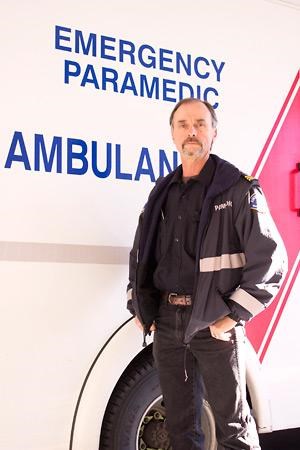Five months after changes were made to the BC Ambulance Service (BCAS) scheduling and payroll system, problems persist, said Powell River ambulance station’s unit chief.
BCAS, which is part of the Provincial Health Services Authority (PHSA), brought the new system online at the end of June. It is an electronic centralized scheduling and payroll system provided by Health Shared Services BC. The switchover caused payroll anomalies for the nearly 3,700 employees across the province, with some receiving less pay and others none at all, said Bronwyn Barter, provincial head of Ambulance Paramedics of BC union.
“We were really unhappy and our membership extremely disgruntled and frustrated,” she said. “We’re happy that they are dealing with the issues.”
Barter said a big problem with the system, that has now been addressed, was payroll stubs. Employees could not determine what they were being paid for or understand what the stubs were saying, she said.
Over the summer many part-time paramedics in the province left the service to work in Alberta oil fields because pay problems left them without money to pay bills, said Barter.
Rob Southcott is the paramedic unit chief at Station 229 in Powell River.
“It was a colossal system change,” said Southcott, “where one system that took arguably 40 years to develop was switched off and a whole different system—completely unproven to function in our highly complex environment—was switched on.”
Until the change, Southcott used to create his station’s employee schedules and audit payroll requests before they were submitted to BCAS payroll department. Now, that work is handled by PHSA data input clerks and a computerized scheduling system.
While other communities have seen part-timers leave, that has not been the case for Powell River. Southcott called his crew “extremely stable.”
He said the initial problems were pretty serious. “We had people borrowing money from family and other sources to compensate for lack of pay. That’s not happening now, but we do have unresolved issues still.”
Four full-time and 14 part-time paramedics work out of the Powell River station. “They’re all established community members and relate to this job as a calling,” he said, suggesting that the fact diminished the “insult and injury” of not being paid. “This community is lucky to have that.”
Despite the progress in addressing the problems with the switchover, Southcott is concerned the streamlined scheduling system does not work within the complexity of station operations.
He explained that paramedics across the province are paid by different qualification levels, by different types of shifts and for different kinds of work. They’re paid to carry a pager for $2 an hour or $10 per hour to be retained at the station. They’re paid for three-hour blocks, or four-hour call-outs or paid full time or overtime on that full time, he added. “That complexity can’t be encompassed by this system very well,” he said. “It’s a one-size-fits-all model.”
He does his scheduling and then inputs it into the system. He said the old system handled the intricacies of station operations better. “You can not eliminate those accommodations without having serious effects,” he added, “and those will go on indefinitely as far as I can see.”
Southcott is critical of the system saying that it may be cost effective because the ambulance service no longer has its own payroll staff, but many costs have been downloaded to the employees, who often do not even know they are making a mistake when they submit their payroll. At the beginning of November, he and his crew received a 111-page manual for filing payroll.
“[BCAS is] trying to look after us—it’s the system that’s failing us,” he said.
Kelsie Carwithen, a BCAS media spokesperson, explained that while the service faced some challenges over the summer with the transition, the situation is improving.
“It’s important to note that all employees are being paid,” said Carwithen. “Paying our staff accurately is of utmost importance and we’re taking this issue seriously. We have been working hard to address the outstanding issues with the systems and I’m pleased to report we have made great progress.”
Carwithen said that during the last pay period, in November, less than one per cent of its employees received a pay cheque that had substantial financial errors and that employees were given manually written cheques within four days to ensure staff were paid promptly.
Southcott said for every mistake that’s made, his crew has to spend time, unpaid overtime, to create reports and file them with BCAS to rectify the issue.
“It’s fair to expect that employees are going to audit their pay,” he said. “But when they have to do extra work to fill out a whole bunch of extra forms, that’s work that really a payroll department should be doing and used to do,” he said.
The union is encouraging paramedics with discrepancies in their pay to file grievances, but even that adds to the frustration, he said. The union currently has 200 grievances that they are still processing from the summer.
Southcott added, “We now will have a considerable amount of extra work simply making this new system work—that’s annoying.”



